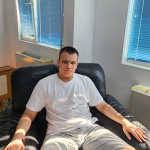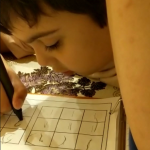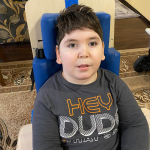Fear of the Shower in Autism
Although autistic individuals usually enjoy water and related activities, many experience discomfort when taking a shower and therefore try to avoid it. However, it is important to maintain personal hygiene, so if the shower is a source of anxiety or even stress for a child, it is essential to first understand the cause.
The common causes include:
- Sensitivity to water. This can be related to the feeling of droplets on the skin, water temperature, water pressure, and so on.
- The sound of water. The loud sound of water flowing from the shower can be unpleasant or even cause pain.
- Temperature changes. Chills or heat after a shower can be a source of discomfort.
- Lack of understanding of the process. If the child does not understand why they need to bathe or what will happen after the procedure, their anxiety level may increase.
- Negative experiences. The shower may have previously led to unpleasant consequences, such as too hot water or an unexpectedly strong stream.
There may be other causes as well, but once identified, alternative solutions can be found to solve the problem.
For example, if the strong water flow is unpleasant, a showerhead attachment can be used to disperse the water into finer sprays. A temporary alternative to the shower could be a bath or other skin-cleaning methods, such as wet wipes. Music can also play a role — many people feel calmer when their favorite song is playing.
It is also helpful to “get acquainted” with the water — initially touching it with the hand or letting it fall on the body under the shower, which will also allow the child to choose a comfortable temperature. It can also be useful to develop bathroom and plumbing skills: the child can start by standing under the unturned shower, then turn on the water, direct the stream at their feet, and, if all goes well, gradually become more comfortable with taking a full shower. If predictability helps, cards with pictures showing the steps of taking a shower can be created.
It is also possible to resolve the issue by giving the child a sense of control over the situation. For example, allowing them to decide when to turn on the water. Their favorite toy, soap with a pleasant scent, or the presence of a parent who hands them a towel immediately after the shower to dry off may also help. In general, it is worth experimenting to make the shower less anxiety-inducing.
However, these tricks will not address the root cause of the situation, as these fears, like many others, are linked to autism, which alters perception. There are many ways to correct this condition, but none are as effective as cell therapy, which addresses both the symptoms and the disorder itself. This is a modern, safe, and natural approach to treating autism that may become the primary treatment over time.
The Essence of Cell Therapy
Cell therapy involves the transplantation of stem cells — the basic elements of the body that can transform into any other type of cell and replace them. This process leads to a renewal, where damaged cells are replaced by healthy analogs. The positive result, in the form of the normalization of brain and nervous system function, is noticeable soon after the procedure and lasts for a long time, often for life. This greatly increases the effectiveness of additional corrective measures.
Cell therapy has already become a widely recognized method practiced by leading clinics around the world. One such clinic is the Mardaleishvili Medical Center, where highly qualified doctors with extensive successful experience in applying this technology perform stem cell transplants using state-of-the-art equipment. The quality of services meets the strictest international standards, while the cost of therapy is lower than in other countries. Another advantage is the opportunity to receive help with travel planning, accommodation arrangements, and other aspects.
Cell Therapy — A Chance to Overcome Fears and Other Autism Symptoms!
Autism Treatment Center Videos
Autism treatment with own stem cells
Cord blood association congress
International Quality Crown
Autism Treatment Reviews
Autism treatment with own stem cells
The story of Alessandro (6 years old)
Autism Patient Testimonial - Stem Cell Treatment
Clients Testimonials

Feedback from Igor, David’s father (12 years old) Read More

Feedback from Olga, Fedya’s mother Read More

Feedback from Natalia, Radomir’s mother (15 years old) Read More

Feedback from Esther, Samuel’s mother (8 years old) Read More

Feedback from Abibe, Selim’s mother (7 years old) Read More












